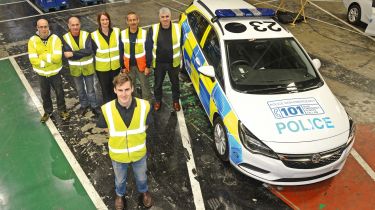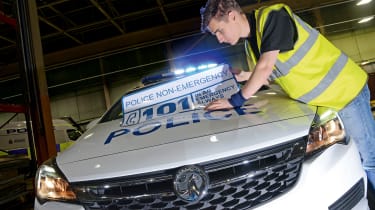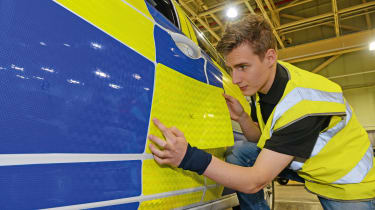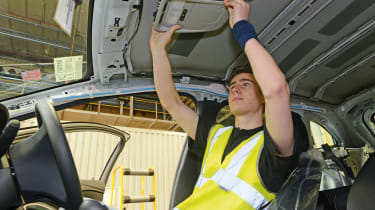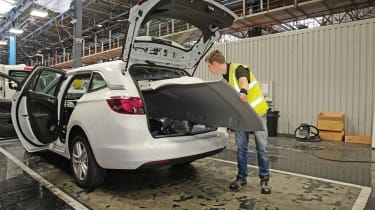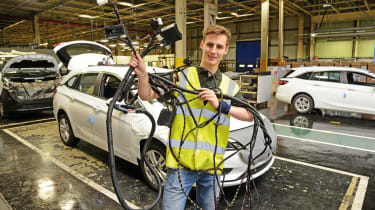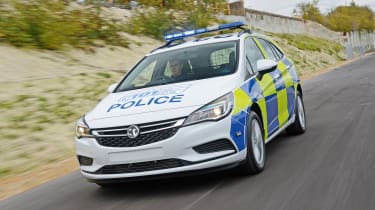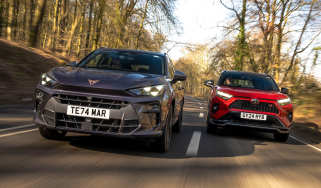How to build a police car: equipment, lights and more
We visit Vauxhall’s specialist production facility dedicated to building police cars, and turn a humble Astra into a patrol vehicle
Is there a vehicle that triggers more childlike curiosity than the police car? Whenever a local force parks up for a public demonstration at a school sports field or shopping mall, it’s not just the kids found scurrying around the vehicles – sparkly-eyed parents, too, can be seen poring over the latest, hi-tech models. But have you ever wondered how a police car is built?
Reflective liveries aside, externally the cars look strikingly similar to those found in showrooms across the country, but inside they’re actually very different in terms of function and specification.
• Police cars - the best and worst
Vauxhall, already the biggest UK supplier of vehicles to the force (which has a 45,000-strong fleet), opened a bespoke plant in Luton, Bedfordshire, in October. It plans to produce 2,400 emergency vehicles a year at the facility, which replaces its old factory at Millbrook. Intrigued, Auto Express accepted an invitation to the production line. Donning high-vis vests and slipping into steel-toed shoes, we prepared for a day’s hard graft.
Luton’s operation is divided into 12 sectors, each with a distinct purpose, from applying interior trim to installing the blue flashing lights. Our job for the day is to work on an Astra Sports Tourer which is destined for life on the West Mercia and Warwickshire traffic patrol. Cars earmarked as police vehicles are transported straight from the Ellesmere Port plant in Cheshire to the Luton factory.
“We’re the only manufacturer that works in this way,” says Dick Ellam, manager of Vauxhall Special Vehicles. “We get the vehicles directly delivered to us from our factories around the world and convert them in-house.
• Should you buy a used police car?
“Other car makers will sell cars to the police and the police will then have to pay a third-party modifier to turn them into service vehicles. They come to us without things like the roofbars or infotainment installed.”
This approach saves money as well as time – there is little point removing parts from cars and replacing them with police-spec alternatives. Thriftiness cannot come at the expense of quality, though, as Sarah Wood, head of transport for Staffordshire Fire and Police (which buys from Vauxhall) explains. “A police car is a workhorse – it needs to work, it needs to be safe, as we cannot afford to have a vehicle let us down,” she tells us.
It’s not unusual for a police vehicle to cover 40,000 miles in its first year on the road and for it to be replaced after just three years of service. Accordingly, the cars are rigorously tested before they even arrive in Luton. For example, vehicles are driven at 50mph and the brakes then slammed, the process being repeated 50 times to ensure optimum performance.
With our Astra having successfully completed its tests, we follow it to the first bay and start to remove some interior trim. Each piece is placed on a trolley that is partnered with the vehicle, avoiding confusion when it is reinstalled. The car is then put into neutral and pushed to the second bay where we help worker Peter Mackay drill holes into the roof so that wiring can be fed through to the lights.
Instead of making holes in the centre, we carefully drill through the roof gutter – this method ultimately helps with resale values. Once a car’s race as a patrol vehicle has been run, it is sent to auction and these cleaner lines will appeal more to prospective private owners.
“This is just another way we help to ensure the car’s residual values remain as high as possible,” says Ellam. Vauxhall estimates forces can claw back between £700 and £1,500 per vehicle this way. As we make our way along the factory floor, it is interesting to note there are no robots whirring about nor any other signs of automation – all work is done by hand as the cars are pushed from one station to the next.
• 50 years of Volvo polie cars
“There are two reasons for this,” says Ellam. “The first is modern cars like the Astra Sports Tourer aren’t built to be taken apart by machines, so it has to be done by hand.”
The second is that there is no single standard police-spec car. Each of the 45 police forces in the UK can order a unique vehicle from Vauxhall to match its requirements.
“To understand why, you have to remember police forces are steeped in history. They’re proud of their heritage, but they also have very different needs due to the geographical areas they are based in,” Ellam tells us.
For example, while most police forces prefer diesels due to their low running costs and higher torque, the Met Police in London is looking at petrol cars for the future, as the capital continues to clamp down on emissions.
• Riding shotgun with an ambulance crew
The last few years have seen steps towards uniformity, however. “The livery is now standard across the forces, as is the lighting and the light bursts,” says Ellam. “There are currently three different radio communications devices for the police to choose from, but in the future we can expect to see a more standard spec for the police cars.”
We move to the fourth and fifth bays, where exterior parts are stripped from the cars. We’re handed a plastic bag that contains metres of wire and 56 different plug-ends – the wires will be installed throughout the vehicles to power increasingly sophisticated electronics. The modern-day police car is essentially a computer on wheels boasting the likes of mobile data systems, cameras to read licence plates and data collectors.
“The nature of the police car is completely different today. The patrol vehicle is now very much a mobile office for the police,” says Ellam.
• Training with the UK emergency services
In the past, police officers would take notes at an incident scene, speak to witnesses and then drive to the station to write up their reports. Today, they can use tablets to upload those reports to the main police server directly from their cars. In the future, Vauxhall hopes to have every police force connected via either 4G or new, innovative satellite technology that offsets poor signal in remote and rural areas. Electronics connected, the interior trim is replaced, and the car is rolled off the production line to a separate location where the livery is applied.
Although the reflective colour patterns have been standardised (you would have to go back to 1998 to find police cars with different schemes across the UK), it still takes workers hours to piece the puzzle of panels together – a single employee can finish just three cars in a day.
The final stage in the conversion from everyday car to bespoke police vehicle involves the installation of communications systems and other specialist equipment.
Not every vehicle that comes out of the plant is given a full tour round the block, but Auto Express can’t resist getting behind the wheel of a shiny new police car and sending the blue lights flashing. We give the 1.6-litre Astra Sports Tourer a quick spin to ensure it’s up to the high standards demanded by the force, and although it drives like an everyday model, it feels very different indeed.
What are the best and worst police cars? Find out here...
Find a car with the experts
